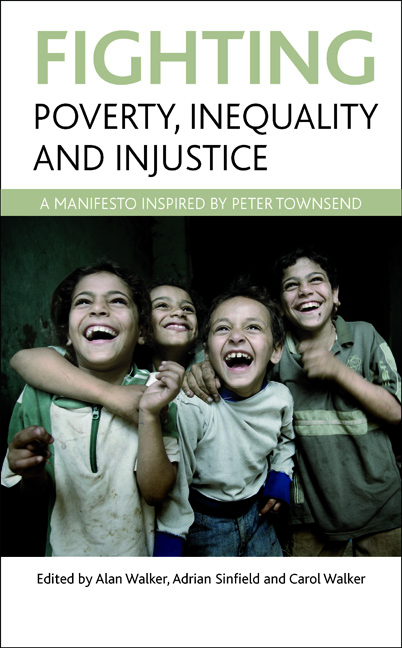Book contents
- Frontmatter
- Dedication
- Contents
- List of figures and tables
- Preface
- Notes on contributors
- one The legacy of Peter Townsend
- two The making of a pioneer researcher: reflections from Peter Townsend’s life story
- three Peter Townsend, a man ahead of his time: re-reading The family life of old people and The last refuge
- four The case for universal child benefit
- five Poverty
- six Social justice for children: investigating and eradicating child poverty
- seven For universalism and against the means test
- eight Underclass, overclass, ruling class, supernova class
- nine Addressing health inequalities: building on Peter Townsend’s legacy
- ten Towards a new sociology of ageing: from structured dependency to critical gerontology
- eleven Disability: prospects for social inclusion
- twelve Putting the lawyers in their place: the role of human rights in the struggle against poverty
- thirteen Radicalising social policy in the 21st century: a global approach
- fourteen Conclusion: building on the legacy of Peter Townsend
- Index
eight - Underclass, overclass, ruling class, supernova class
Published online by Cambridge University Press: 01 September 2022
- Frontmatter
- Dedication
- Contents
- List of figures and tables
- Preface
- Notes on contributors
- one The legacy of Peter Townsend
- two The making of a pioneer researcher: reflections from Peter Townsend’s life story
- three Peter Townsend, a man ahead of his time: re-reading The family life of old people and The last refuge
- four The case for universal child benefit
- five Poverty
- six Social justice for children: investigating and eradicating child poverty
- seven For universalism and against the means test
- eight Underclass, overclass, ruling class, supernova class
- nine Addressing health inequalities: building on Peter Townsend’s legacy
- ten Towards a new sociology of ageing: from structured dependency to critical gerontology
- eleven Disability: prospects for social inclusion
- twelve Putting the lawyers in their place: the role of human rights in the struggle against poverty
- thirteen Radicalising social policy in the 21st century: a global approach
- fourteen Conclusion: building on the legacy of Peter Townsend
- Index
Summary
Introduction
One man in his mid-thirties hoped that his six-figure income would grow rapidly, and admitted that his assets would be valued at nearly a million pounds. He held strong views about poverty. ‘There is no poverty. Now you can get money from the state. People don't even have to go to work. You don't have to put up with working in an unrewarding situation.’ He strongly disagreed with the propositions that the gap between rich and poor was too wide and that the rich should be more highly taxed. He strongly opposed the idea of putting limits on ‘some people's expensive way of living’ to reduce poverty and disagreed with the statement that a lot of people entitled to claim benefits do not claim them. Finally, he strongly agreed that cuts in public services like health and education could be made without increasing the number of people in poverty and that, if there was any poverty, it was more likely to be reduced by increasing Britain's wealth than by making incomes more equal. (Peter Townsend, describing the views of one of the new overclass of London, recorded in 1985-86; see Townsend, 1993, p 109)
By 2010 one in ten of all Londoners had the wealth of the man who Peter had described some 25 years earlier as being part of a tiny elite (see Hills et al, 2010). The Hills inquiry into inequality revealed that one in ten Londoners now have wealth of nearly a million pounds, some 273 times the wealth of the poorest tenth of today's Londoners. The Sunday Times Rich List of spring 2010 reported that the wealth of the richest 1,000 people in Britain had risen by 30% in just one year. And this was not any old year, but the first full year after the economic crash of 2008. Above the overclass, above the ruling class, the wealth of a new supernova class was exploding in size.
As the pound fell against other currencies, property values in Kensington and Chelsea, the richest borough in the world, escalated, while housing prices almost everywhere else in Britain fell, or rose only slightly.
- Type
- Chapter
- Information
- Fighting Poverty, Inequality and InjusticeA Manifesto Inspired by Peter Townsend, pp. 153 - 174Publisher: Bristol University PressPrint publication year: 2011
- 1
- Cited by



